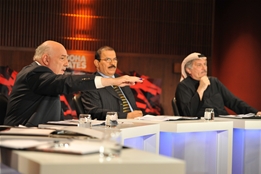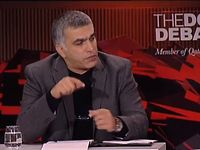This House has no confidence in Bahrain's promise to reform
Monday December 12 2011
MOTION PASSED
by 78% to 22%
Details

Bahrain's ruling family was dealt a blow last night after an audience made up of mainly young Arabs used a globally televised debate to say the monarchy was unlikely to make good their promise of reform.
The motion was passed by a resounding 78% in favour and 22% against - a slap in the face for a government promising its people long-awaited political reform.
The session, part of the eighth series of the award-winning Doha Debates, a leading platform for free speech in the Arab world, comes just weeks after an official investigation found that Bahraini government security forces had used excessive force and widespread torture against anti-government protesters earlier in the year.
Tens of thousands of mainly Shiites took to the streets in Bahrain in February and March demanding political reform and better rights, with some calling for the downfall of the Al Khalifa monarchy. The uprising was brutally crushed by the regime and thousands were arrested and sacked from public and private sector jobs.
A government-sponsored inquiry into the unrest, led by respected Egyptian-born human rights lawyer Cherif Bassiouni, made a series of recommendations, which a special commission in Bahrain is studying. King Hamad bin Isa Al Khalifa has promised reform.
In often sharp exchanges between panellists and audience members, Nabeel Rajab, President of the Bahrain Center for Human Rights and Christopher Davidson, a Reader of Middle East Politics at Durham University in the UK consistently argued that Bahrain's monarchy were not interested in taking the country forward.
Rajab accused the government of repeated human rights violations against its people, while Davidson said the recent Bassiouni report amounted to the government "papering over cracks".
"This is yet more window dressing - short- term measures rather than genuine reform," he said.
Arguing against the motion, Abdulla Alderazi a lecturer at the University of Bahrain and Khaled Almaeena, Editor-at-Large of Arab News, an English language newspaper in Saudi Arabia, said Bahrain could and should reform. "For any government, reform is a necessity; it's not an option or a choice," Almaeena said.
At one point, Ala'a Shehabi, a Bahraini, whose husband has been a political prisoner for 8 months, stood up in the audience and said: "I don't want to live off a whim of a king that decides to jail people."
Saudi Arabia, which helped Bahrain put down the protest movement, had become the "counter revolutionary force" in the Arab Spring, Davidson said. "I think one of the most dangerous things in the Arab Spring are the Saudis," added Rajab.
Asked a straight question Alderazi, who said he had confidence in Bahrain's promise of reform, nevertheless called for the prime minister to resign after more than 40 years in office. The kingdom, he said repeatedly, needed to move forward.
Watch online


